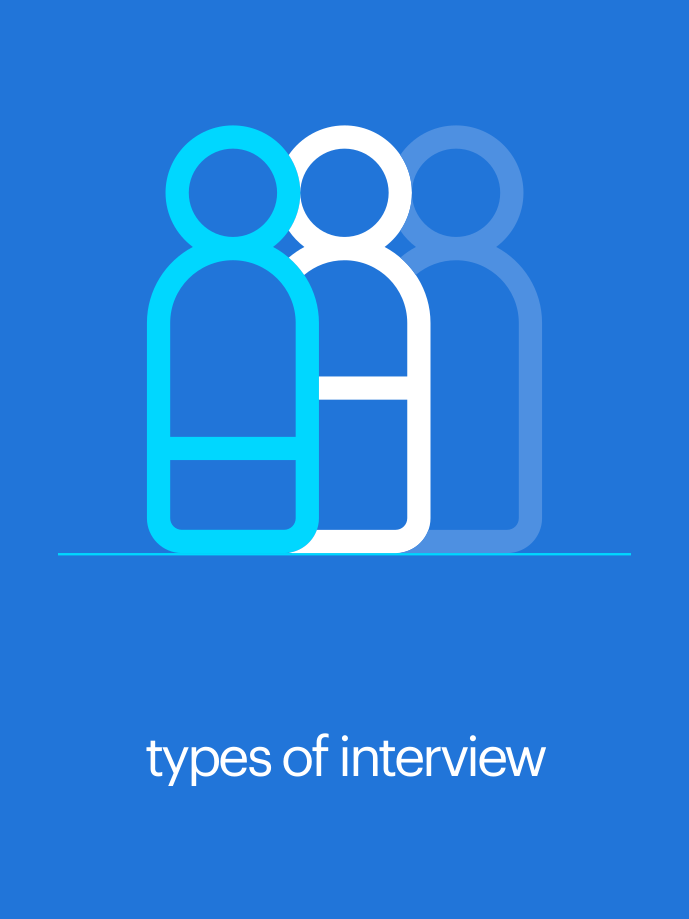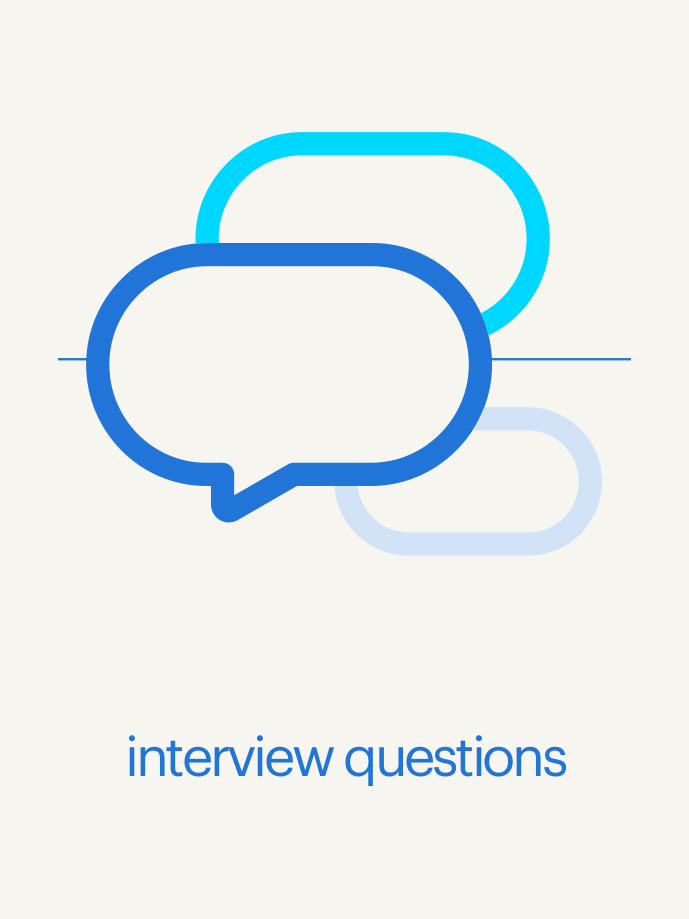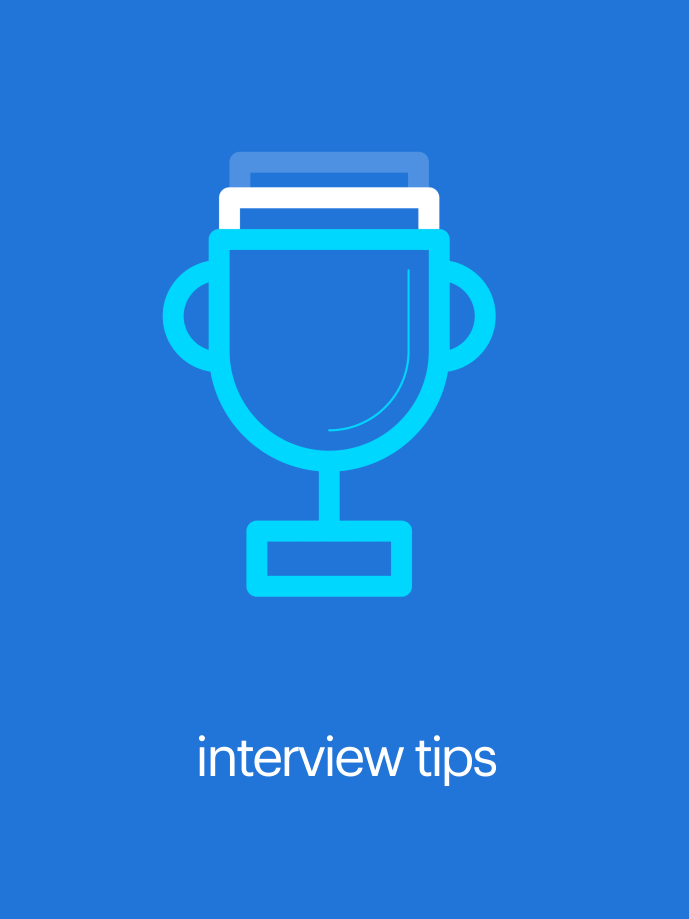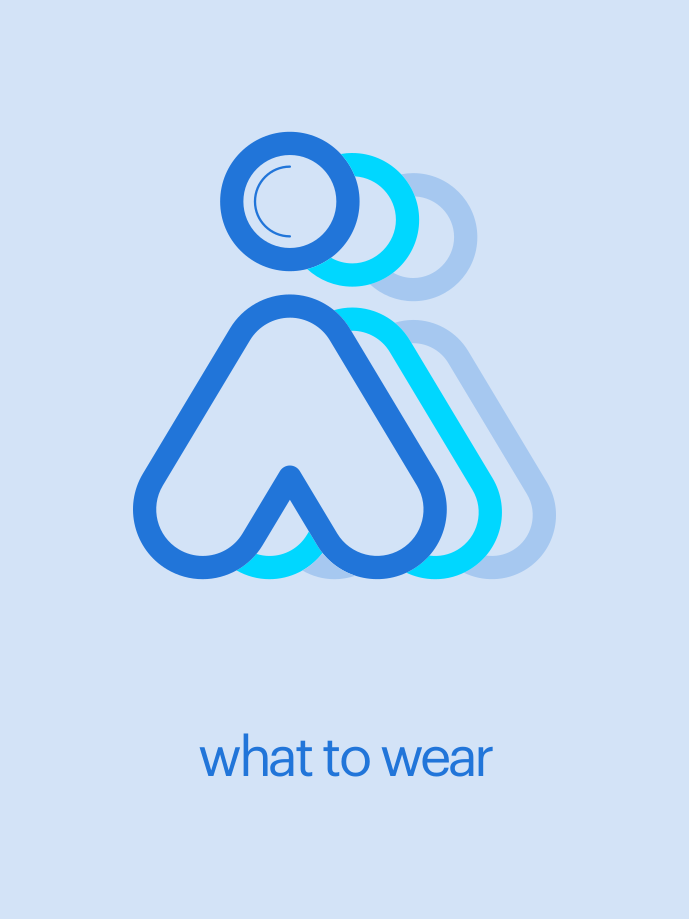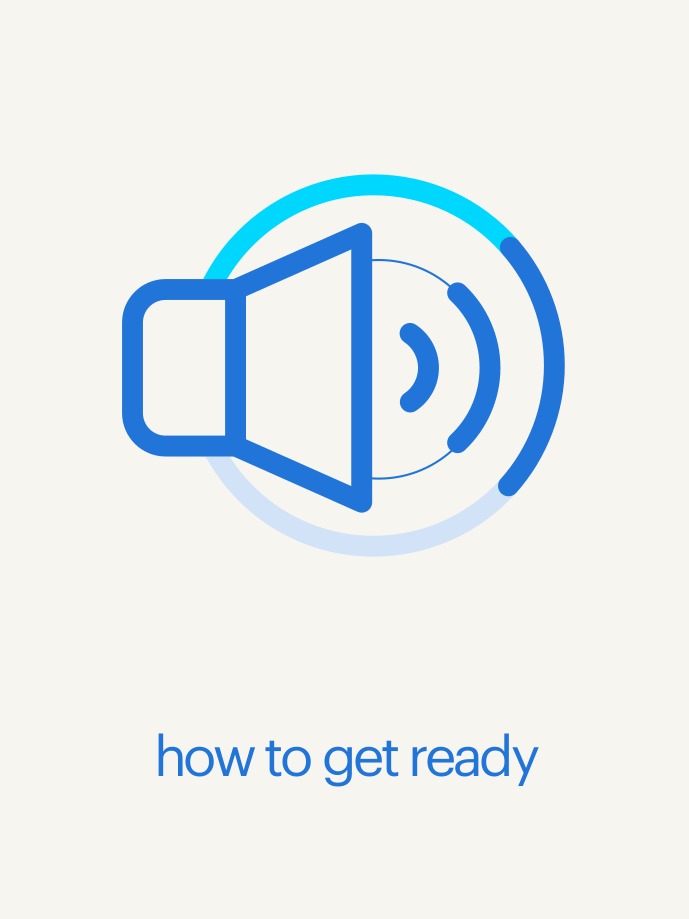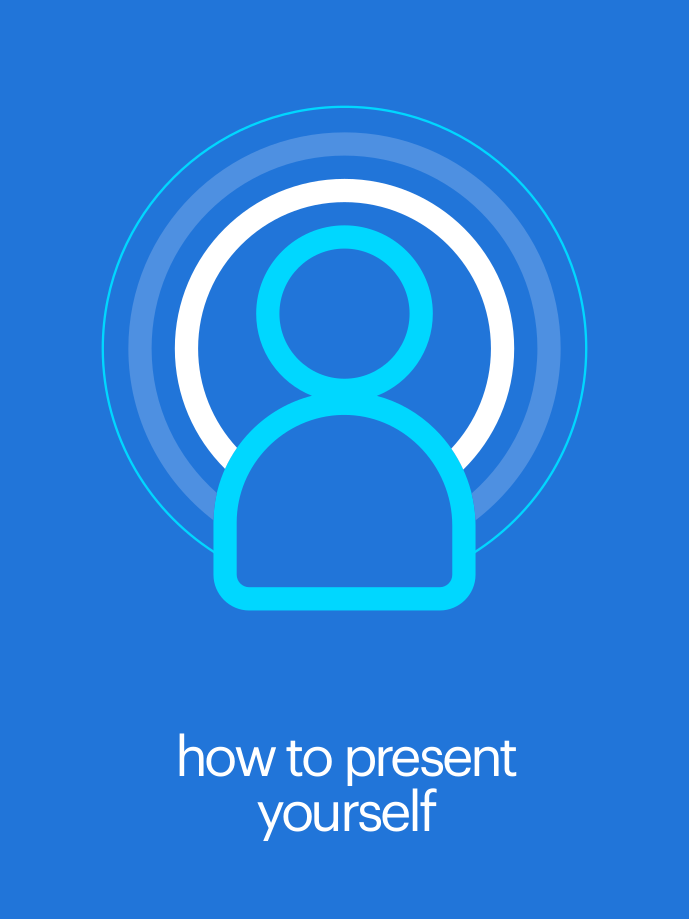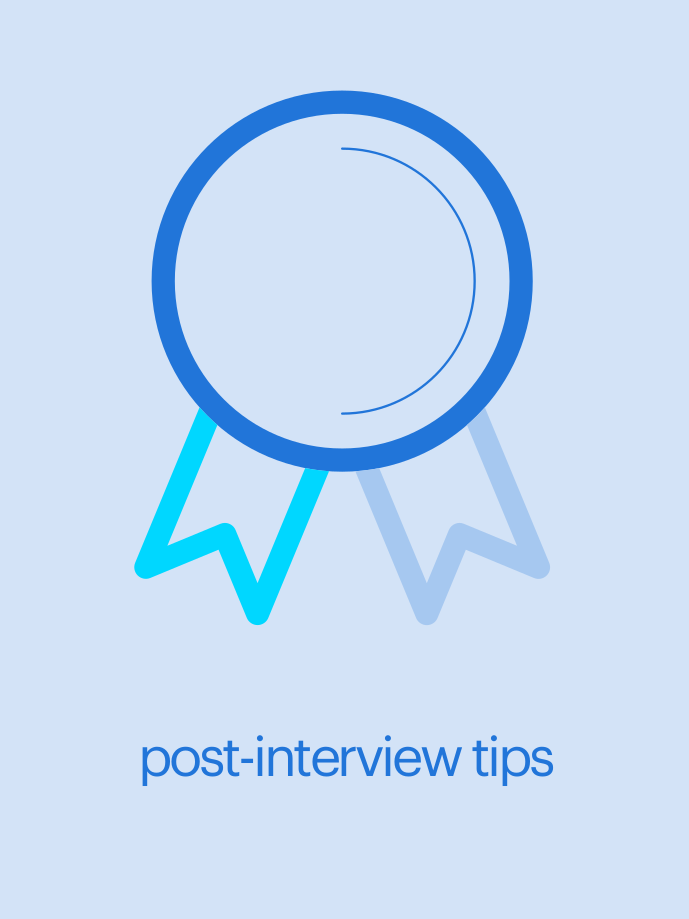get started
Getting ready for a job interview is an essential part of your career journey. Job interviews offer you a platform to showcase their abilities, experience, and personality to your employer. As much as facing an interview might seem challenging, your chance of success at an interview can be increased remarkably, if you understand the nitty gritty of all stages in the process from preparation to follow-up.
To help you, we have divided this series of articles into main themes:
types of interview
This section is carefully crafted to enlighten you about the various interview formats you might encounter. Dive into your go-to-guide to tackle any interview format right from conventional one-on-one sessions, discussions with a panel, or online interviews. This guide offers you an insight into the essential necessities of every format and equips you with valuable knowledge on each format. Empower your interview journey with powerful strategies and device effective techniques to nail your conversation.
-
5 common types of video interview questions
Interviewers can test your attributes, abilities, and skills. Dividing an entire interview session into categories such as ice-breaking, personality, motivation, skills and abilities, and spontaneity can be an intelligent approach to give an impactful performance. With video interviews becoming an essential part of any interview process, creating an impact virtually can be challenging. Understanding question categories to craft responses unique to your personality can boost your confidence and help you navigate through your discussion effortlessly.
Check out our full article and gather tips to ace your next video job interview!
read more -
6 types of interviews and how to prepare for them
Job interviews come in various formats, each with its own challenges. Here's a summary of the different interview types and key tips to help you navigate them:
- Phone Interview: Choose a convenient time when you can think clearly and speak openly. Phone interviews can be brief, but they form an initial impression of you, and it better be positive.
- Video Interview: Dress professionally, find a quiet location, and remember to wear pants!
- In-person Interview: Stay cool, connect with every person in the interview panel, and show them what you can offer for the job.
- Group Interview: Stand out by showcasing unique skills while being a team player.
- 'Let’s Grab Coffee' Interview: Be professional and keep a composed demeanor, although the format is informal.
- Test or Working Interview: Demonstrate your skills through quizzes, assignments, or special tasks that test your knowledge on the tools in your domain. Don't forget that these tests are timed.
Asking questions in any interview format displays your attention and inquisitiveness. Curiosity can spike the interviewers' interest in extending the conversation with you.
To gain an in-depth understanding of the different interview formats and discover your path to a superlative interview performance, check out our full article.
read more
frequently asked interview questions
Equip yourself to face the most difficult interview questions with poise. This section explores a range of general and sector-specific inquiries, enabling you with tools and strategies to articulate your strengths and accomplishments convincingly.
-
17 tough interview questions
Wondering how to tackle tough interview questions? Some discussions can get trickly. Don't stress! We've identified 17 difficult interview scenarios and curated strategies to help you answer them.
From "tell me about yourself" to "do you have any questions for me," get an overview of all kinds of questions you might encounter in a job interview. Whether it's discussing your strengths and areas of improvement, explaining why you're leaving your current job, or sharing how you handle criticism, our tools empower you to perform with confidence and impress potential employers.
Remember, interviewers analyze your performance to determine your fitness for the role. Staying honest and thoughtful in your responses can built the initial impression in the interviewers' minds, just right!
read more
Check out our blog post to tackle any puzzling question that comes your way! -
how to answer ‘tell me about yourself’
Do you know that unsettling feeling when an interviewer asks, "Tell me about yourself"? This question can stump even the most prepared candidates. But stay calm, we've got you covered.
read more
In our latest article, we examine why this question is so often asked and how you can turn it into an opportunity to shine. Get tips on creating an elevator pitch that emphasizes your strengths and sets the stage for a successful interview. Additionally, we outline the key components that your pitch should include and offer advice on how to adapt your answer for each job opportunity. Don't miss out on this invaluable advice! -
how to answer ‘why do you want this job?'
Struggling to curate an impressive reply to the common question, "Why do you want this job?" You're not alone. Most job-seekers find this question tricky. Don't fret, we're here to help!
read more
Our latest blog post explores why interviewers pose this question and what they wish to uncover. Discover strategies to craft an impactful response, which aligns with the values and culture of the organization you're interviewing for. Learn how to showcase relevance in your skills with an intrigue for the role you're applying for. On the other hand, the blog sheds light on common pitfalls to avoid, such as vague or insincere responses.
Dive in to discover the secrets of igniting a compelling dialogue with your interviewer, distinguishing yourself from the competition. Rest assured, we've got your back! -
how to answer ‘tell me about a time when…’
Behavioral interview questions, often framed as 'tell me about a time when' scenarios, evaluate your storytelling skills.
read more
Developing a collection of narratives is an effective method to showcase the most challenging situations, how you've overcome them, and what you've learned from those experiences.
Utilizing the STAR (Situation, Task, Action, Result) framework allows for concise storytelling, highlighting essential points while eliminating unnecessary details. Structure your answers with bullets to ensure clarity and complement your narrative with an optimistic conclusion, particularly when discussing less positive experiences.
Pay attention as the interviewer hints at the ideal candidate's qualities and steer the conversation toward the lessons you've learned throughout your journey. -
how to answer ‘what is your biggest weakness?’
When asked about your biggest weakness in a job interview, it's crucial to demonstrate self-awareness. Simply dodging the question or offering overly candid responses can impede the flow of the conversation.
Instead, opt for a weakness that is actionable and discuss the steps you're actively taking to improve. Avoid clichés like "I'm a perfectionist" and aim for a concise, specific answer with tangible action points and a realistic timeframe.
Stay authentic and illustrate how you've navigated real-life challenges to showcase your commitment to learning and development. Remember, the interviewer is likely not scrutinizing this question as much as you think. If you're struggling to pinpoint weaknesses, consider common areas for improvement and how they relate to your professional journey.
read more -
how to talk about being let go in a job interview
Losing your job can indeed be tough, but it's crucial to bounce back and reassess your direction. Anticipate questions about why you were let go in future job interviews. Here's valuable guidance on handling these situations:
- Know what you can and can't say, considering any non-disclosure agreements or company policies.
- Leave your emotions at the door and maintain a professional demeanor throughout the discussion.
- Be honest about the situation, as employers may conduct background checks and contact your past colleagues.
- Avoid speaking negatively about your former employer or colleagues.
- Accept this uncomfortable discussion and own your experience confidently.
- Provide a brief explanation without dwelling on the topic.
- Treat the experience as a learning opportunity, but give a concise answer if given an opportunity to speak about it.
- Focus on how you've turned the adversity into an opportunity and what you bring to the table.
Remember, being let go doesn't have to be the end of your career story. It can also serve as a springboard to propel you towards even greater organizations and opportunities. Your resilience and adaptability in the face of adversity will not only shape your journey but also reveal your ability to thrive amidst change.
read more
Embrace the journey ahead with confidence, knowing that every experience, including setbacks, contributes to your growth and success.
interview tips
Dive into this comprehensive segment packed with guidance and expert recommendations to boost your adaptability and performance. Discover how to make a remarkable first impression, handle ambiguity, and steer tough conversations confidently. Your preparedness is the key to leaving a lasting, positive impact on potential employers.
Our interview insights power you with grace and elegance to face any interview effortlessly.
-
how to nail a job interview?
Prepared to nail your job interview and outshine the competition? Check out our 7 essential tips to make an unforgettable mark.
read the full article
From diligent preparation and practicing your answers to showcasing your skills and asking insightful questions, we've got you covered. Learn how to radiate confidence and professionalism, communicate effectively, and close the deal with finesse. Don't miss out on these expert insights to take your interview performance to the next level! -
why your job interviews aren't leading to job offers
Getting an interview call is only the first step in landing a job offer. To succeed, you need to demonstrate to your prospective employer how well you fit the position. Many job-seekers, however, struggle to turn interviews into job offers due to common mistakes.
In this article, we'll uncover these pitfalls and offer actionable tips for success:- Insufficient preparation
- Lack of confidence
- Not emphasizing strengths
- Robotic demeanor
- Generic resume
- Missing interviewer cues
- Displaying lack of interest
- Unrealistic salary expectations
Turn every interview opportunity into a job offer, regardless the format. Identify your areas of improvements and implement our expert guidance to secure your dream job!
read more
Elevate your job search with this helpful advice. -
what to do if your job applications aren't leading to interviews
Struggling to standout and grab recruiters' attention? With more job-seekers than ever, companies are inundated with application. If you aren't hearing back, it's time to rethink your approach. We're here to assist. Consider taking these key actions:
- Revamp Your Resume: Ensure your resume is flawless and tailored for each role.
- Optimize for Automated Systems: Enhance your application with keywords from the job posting.
- Assess Job Fit: Target roles that suit your qualifications.
- Follow Application Instructions: Thoroughly read and complete all application steps.
- Audit Your Social Presence: Ensure a professional image across all social media platforms.
Stay persistent and continually tweak your strategy to boost your chances of securing a dream role at top-tier organizations. Keep reading - the right opportunity is just around the corner!
read more -
tips to ace a video job interview
In today's digital era, virtual interviews have become the norm, especially with the rise in online job-seekers. Despite their informal feel, it's essential to approach them with the same seriousness as in-person interviews. To help you ace your next video interview, we've put together a guide with tips for success:
- Set the scene: Create a professional backdrop by selecting a well-lit space and eliminating any distractions. If decluttering isn't possible, consider using a blur filter.
- Test your tech: Make sure your internet connection is reliable and test your video and audio quality in advance. If issues arise, proactively seek solutions or request alternative interview methods.
- Dress for success: Balance professionalism and comfort by dressing up on top while staying comfortable below. Resist the temptation to wear sweatpants during the interview.
- Pay attention to social cues: Nonverbal communication is critical in virtual interviews. Be aware of your body language, maintain eye contact, and stay engaged throughout the discussion.
- Send a thank you email: After the interview, send a brief thank you email to express your gratitude for the opportunity. Match the tone of your email to that of the conversation.
For more tips on acing virtual job interviews and accessing additional resources for interview preparation, read on. We're here to support you every step of the way!
read more
what to wear to a job interview
Delve into this enriching section, brimming with valuable advice designed to refine your interviewing skills. Uncover effective strategies for leaving a stellar first impression, adeptly handling difficult questions, and driving a memorable conversation with your potential employers. With our diverse assortment of interview tips, you'll approach every interview with unwavering confidence and grace.
-
what should you wear to a job interview?
A perfect first impression extends beyond preparing for your interview and rehearsing answers. Putting on an attire that convey competence. The way you dress for an interview speaks volumes about your professionalism and commitment to the opportunity. While you navigate a maze of wardrobe choices, consider an outfit complementing the culture and vibe of the organization you're interviewing for. Here are some tips:
- Stick with classic styles that you feel comfortable and confident in. Create a go-to interview outfit that you can rely on for future interviews.
- Neutrals such as black, grey, or navy are timeless colors for suits. Avoid loud or flashy patterns and pick high-end fabrics.
- Elevate your look with colorful accessories like a patterned shirt, tie, or scarf that reflects your personality.
- Demonstrate professionalism and avoid dressing in overly casual attire, such as jeans, sneakers, t-shirts, or yoga pants. Despite the workplace's relaxed dress culture, maintain a polished appearance for the interview.
- Women can choose to wear suit pants or a skirt depending on personal comfort and style preference. Opting for a skirt? Keep it knee-length or longer for a polished appearance.
- Remember that your outfit is your silent introduction and projects your unique personality.
- For a video job interview, wear professional yet comfortable clothing, such as a clean collared shirt or blouse.
Besides dressing appropriately for job interviews, effective communication is also important in the evolving future workplace.
read more -
dressing for a job interview in a casual workplace
Over the years, he concept of business casual attire has evolved, with technology companies promoting an ultra-casual environment and encouraging employees to dress comfortably. However, it is wise to realize that not all workplaces have embraced this trend, particularly those with more traditional dress codes.
Your interview attire should align with the role you're pursuing. Here are some guidelines:
- Be authentic
- Ensure your attire matches the job role
- Research the prospective company's social media presence
- Prioritize comfort while maintaining professionalism
how to get ready for an interview
This section offers a detailed checklist to guide you through the process, ensuring you're fully equipped to shine in your interview. We address all aspects, from company research to practicing your answers, so you can approach the interview with confidence.
-
5 tips to help you get past your job interview anxiety
Embarking on a new career or job opportunity is thrilling, but the prospect of a job interview can often induce anxiety. Rest assured, you're not alone in this feeling.
read more
We have five invaluable tips to help alleviate your job interview anxiety and present the best version of yourself to potential employers. By confronting your fears and fostering a positive attitude, you can turn stressful situations into successful interview experiences. Continue reading to find out how these techniques can help you tackle your interviews with confidence and ease. -
13 things to know before going to a job interview
Preparing for a job interview? Our ultimate guide has you covered! From understanding the job requirements to answering common questions, we'll help you ace your interview. Here's what you'll find:
- Assess your interest and explain why you're a good fit for the job.
- Understand the role and company through your research.
- Stay aware of the value you bring to the table and remain adaptive with your salary expectations.
- Identify deal breakers like work-life balance or benefits.
- Prepare thoughtful questions for the interviewer.
- Craft compelling answers to common interview questions.
- Highlight your strengths and address areas of improvement effectively.
- Outline your career goals and understand how this role aligns with them.
- Frame a professional and positive response about leaving your current job.
- Share an example of conflict resolution at work.
Assure your interview success by following these key tips! For a deeper dive, check out our full guide.
read more -
tips for job interviews if you’re on the autism spectrum
Job interviews can be overwhelming, especially for individuals on the autism spectrum. But with these tips, you can be more confident to face an interview and gather some insights into the must-have interview skills:
- Disclose your condition
- Prepare ahead
- Highlight your skills
- Research the company
- Be mindful of your appearance
- Pay attention to your body language
- Use the STAR method for concise answers
- Accompany a person to support you
- Work with a recruiter to stay informed of new updates
Build confidence for your next interview experience by accessing these effective tips to ease your anxiety substantially. Subscribe to our newsletter for more career advice.
read more -
checklist : what to bring to an interview?
Wondering what your interview to-do list should look like? Our checklist comes handy and help you gather all the essentials for your big day. Print it out and pay attention to the following phases:
- The night before the interview
- The morning of the interview
- What to bring with you
Ready? Click below to grab our printable checklist and shine in your job interview!
read more
how to present yourself
We'll guide you through the art of impression management and ensure you present your best self. Discover techniques enhance your body language, tone of voice, and much more.
-
how to plan job interviews when you have a job
Searching for a job while working fulltime can seem quite a daunting task. Most job-seekers keep their interview information discreet. To support you as you navigate this situation effectively, we have compiled helpful tips:
- Request phone or video interviews for convenience.
- Request for discussion slots outside of work hours.
- Give yourself plenty of time to prepare and commute.
- Consider casual interview options like coffee or lunch meetings.
Check out these practical insights to effortlessly balance job hunting with your full-time work schedule.
read more -
words and phrases to avoid in a job interview
Your tone and language speaks volumes about your personality during a job interview. The words you choose not only reflect your attitude but also set the stage for an engaging conversation. Some aspects to avoid to drive a friendly, positive, and inspiring conversation.
- Anything negative about your former company, boss, or colleagues.
- Saying "I don't know" without reframing the question.
- Relying on "it's on my resume" instead of providing additional context.
- Using strong language like "hate" or curse words.
- Mentioning being "fired" without reframing it positively.
- Using vague terms like "stuff" instead of being specific about responsibilities.
- Saying "can't" instead of expressing openness to learn.
- Using half-cut sentences like "sure." instead of giving clear responses.
- Asking basic questions about the company without doing proper research.
- Giving clichéd responses while explaining the biggest weaknesses.
- Not having any questions prepared at the end of the interview.
Curating an effective conversation involves an honest perspective on your current career stage and understanding how you can contribute to your prospective organization. Discover how to craft a compelling chat with your prospective employer and identify the red buttons you shouldn't touch!
read more -
questions job seekers should ask during an interview
Congratulations on making it to the interview stage! This is your opportunity to shine and demonstrate that you are the ideal candidate for the job. To ensure your success, we’ve compiled a list of top questions to help you navigate the interview process with confidence.
Honesty is paramount during an interview. Believe in your abilities and stay attentive to every question. Your thorough company research empowers you to build well-informed and tailored responses, that spark a path to an enriching conversation.
Additionally, asking questions during an interview not only showcases your interest and engagement but also allows you to gain valuable insights into the company’s culture and assess if it aligns with your values.
For more expert tips on making a stellar first impression and acing your interview, continue reading our comprehensive guide. Your dream job's within reach!
read more
post-interview
Your career pursuit doesn't end immediately after your interview. Your post-interview etiquette defines the probability of landing the job. Effectively communicating after your interview either through an email or a quick chat with your recruiter reflects your commitment to the opportunity. Conducting a self-assessment after an interview allows room to identify mistakes and weak areas for you to improve upon. Discover how to expertly manage the critical post-interview phase and solidify your position as a top candidate.
-
should you send a thank you note
Sending a thank-you note after a job interview remains essential, even with the changing media of communication. While it might not secure you the job, it can help you stand out. A thoughtful note shows appreciation and attention to detail. Consider these tips when writing your thank-you email:
- Send it quickly, preferably within 24 hours. If delayed, it transitions to a follow-up rather than a thank-you note.
- Reinforce your enthusiasm for the role and the value you offer.
- Keep it succinct, limited to one or two paragraphs.
- Include extra information like your portfolio and LinkedIn profile.
Read our full article for more valuable tips.
read more -
increase your chance of a second interview with these tips
Enhance your likelihood of securing a follow-up interview by promptly expressing gratitude through a thank-you note or email post-interview. This action not only underscores your enthusiasm and professionalism but also cultivates a positive image in the interviewers' minds. Check out our article and gain an insight into actionable tips for post-interview follow-up and building a stronger bond with the interviewer through an effective personalized dialogue. Interested in more job search strategies? Subscribe to our newsletter comprising exciting articles on excellent career enhancement journeys.
read more
